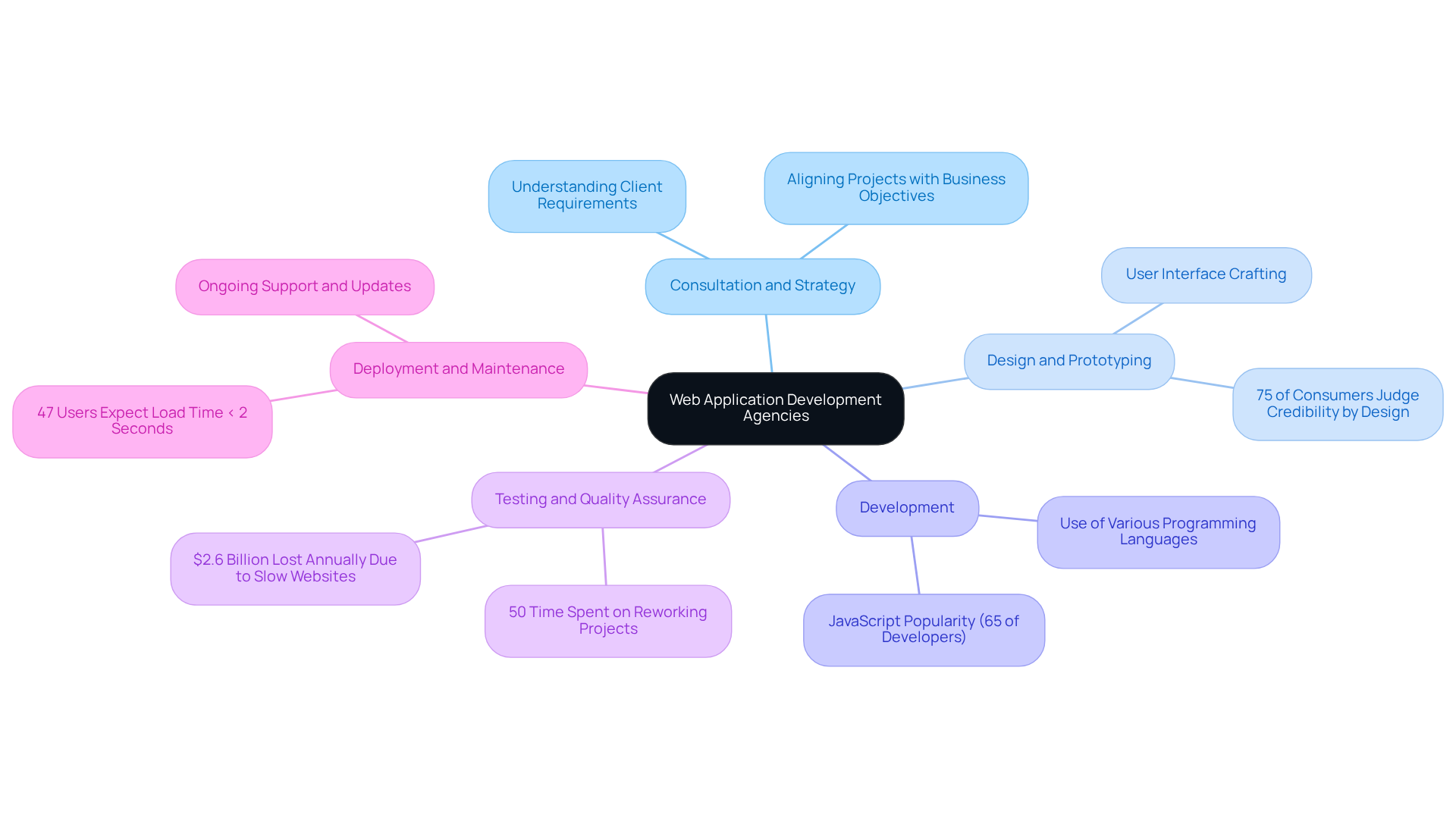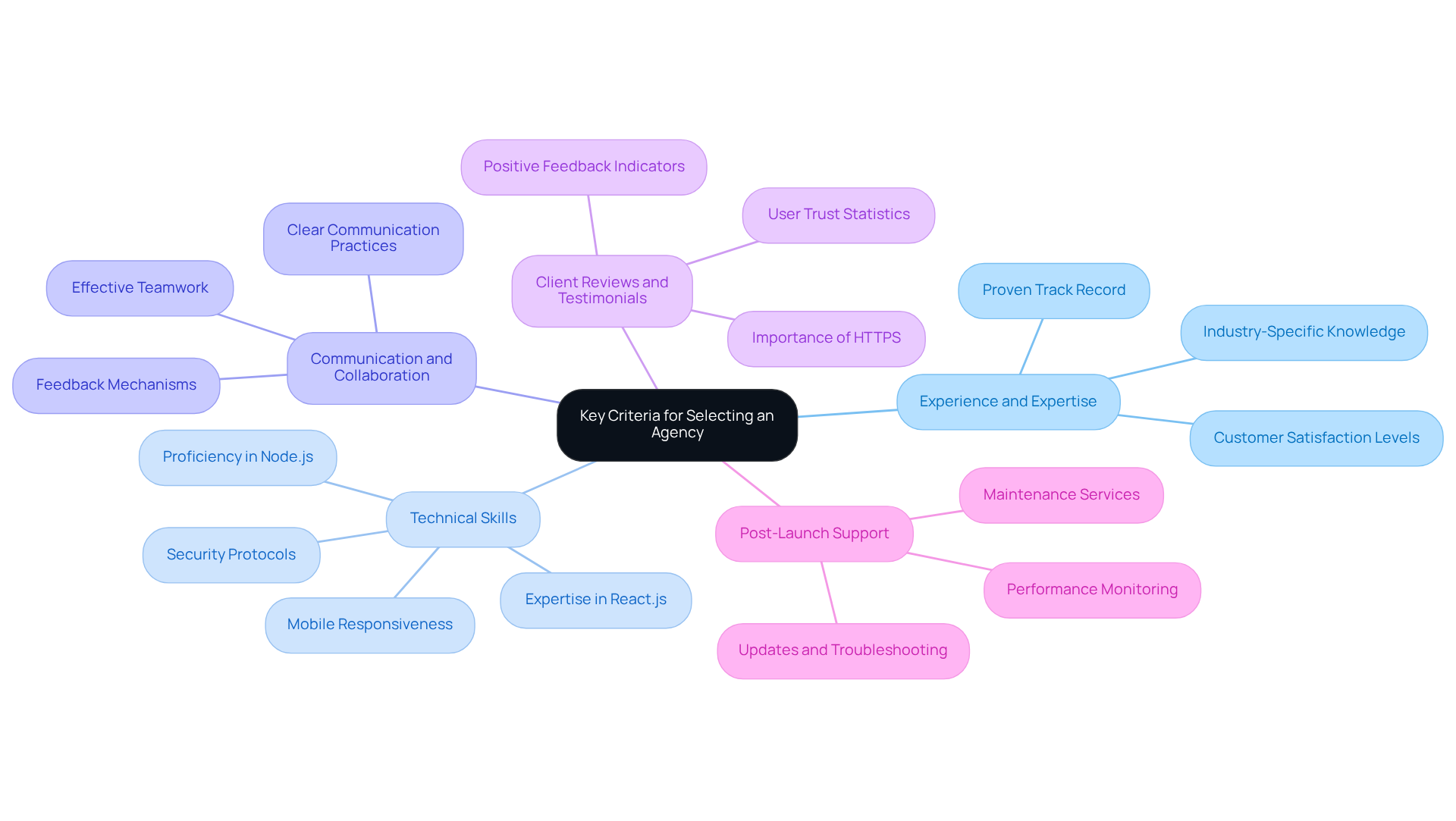AI
our blog
4 Steps to Choose the Right Web Application Development Agency

Overview
The article presents a systematic approach to selecting the right web application development agency, underscoring the critical factors of evaluating:
- Experience
- Technical skills
- Communication
- Client feedback
- Post-launch support
By adhering to a structured process that encompasses:
- Researching potential agencies
- Reviewing portfolios
- Conducting interviews
- Checking references
clients can confidently choose an agency that aligns with their business objectives and effectively addresses common challenges in agency selection. Furthermore, this method not only facilitates informed decision-making but also enhances the likelihood of successful project outcomes.
Introduction
Navigating the intricate landscape of web application development poses significant challenges for businesses aiming to elevate their online presence. With a plethora of agencies providing a wide range of services, it is imperative to understand how to select the right partner to ensure project success. This guide explores the critical steps and criteria for choosing a web application development agency, while also addressing the common challenges that may arise during the selection process.
How can businesses guarantee they find an agency that not only fulfills their technical requirements but also aligns with their strategic vision?
Understand the Role of Web Application Development Agencies
Web development firms, also known as web application development agencies, specialize in designing, maintaining, and enhancing web solutions tailored to meet specific business needs. They employ a diverse range of technologies and methodologies to guarantee that software is not only functional but also user-friendly and scalable. These agencies typically provide services that encompass:
- Consultation and Strategy: Gaining a comprehensive understanding of client requirements and market demands is essential for aligning projects with business objectives.
- Design and Prototyping: Crafting intuitive user interfaces and experiences is critical, as 75% of consumers assess a brand's credibility based on its website design.
- Development: The software is developed using various programming languages and frameworks, with JavaScript emerging as the most popular language in 2023, utilized by approximately 65% of software developers.
- Testing and Quality Assurance: Ensuring the software is free from bugs and performs optimally under different conditions is vital. Developers often dedicate 50% of their time to reworking projects due to preventable errors, and slow-loading websites contribute to a staggering $2.6 billion lost in revenue annually.
- Deployment and Maintenance: The launch of the software and the provision of ongoing support and updates are crucial, especially considering that 47% of users expect websites to load in 2 seconds or less.
Understanding these roles empowers clients to articulate their needs and expectations more effectively when engaging with a web application development agency, ultimately leading to more fruitful partnerships. Furthermore, as 60% of web traffic is projected to originate from mobile devices by 2025, the significance of responsive design cannot be overstated.

Identify Key Criteria for Selecting an Agency
When selecting a web application development agency, it is crucial to consider the following key criteria:
- Experience and Expertise: Prioritize agencies with a robust portfolio and a proven track record in your industry. Agencies boasting more than five years of experience often showcase polished processes and higher customer satisfaction levels, as evidenced by successful initiatives in comparable sectors. Firms with extensive backgrounds are more likely to complete assignments punctually and achieve greater customer satisfaction due to their understanding of sector-specific details.
- Technical Skills: Ensure the organization possesses expertise in essential technologies and frameworks relevant to your project. This includes proficiency in AI integration, mobile responsiveness, and security protocols, which are critical for modern web applications. Notably, Node.js is the most popular web framework, utilized by 47.12% of developers, closely followed by React.js at 42.62%.
- Communication and Collaboration: Assess the organization's communication practices. Effective teamwork is crucial; a clear and responsive organization fosters a productive development process, thereby improving project outcomes. As Rufat Mammadyarov, Director of Engineering, asserts, "Having a slow-loading website can be the number one determining factor in why people leave your website."
- Client Reviews and Testimonials: Investigate feedback from previous clients to gauge satisfaction levels. Positive testimonials can indicate the organization's reliability and capacity to meet client expectations. It is important to note that 85% of users avoid websites lacking HTTPS, emphasizing the significance of security in client reviews.
- Post-Launch Support: Inquire about the organization's post-launch services, including maintenance, updates, and troubleshooting. Continuous assistance is essential for the long-term success of your website, ensuring it remains operational and current. Websites should ideally load within three seconds, underscoring the importance of ongoing support in maintaining website performance.
By concentrating on these factors, you can make a more informed decision when selecting a web development firm that aligns with your business objectives.

Follow a Step-by-Step Process to Evaluate Agencies
To effectively evaluate web application development agencies, follow these steps:
- Research potential organizations by compiling a list of firms that are a web application development agency. Utilize online directories, referrals, and industry forums to gather a diverse range of options.
- Review Portfolios: Examine the portfolios of shortlisted agencies to assess their design aesthetics, functionality, and relevance to your endeavor. Look for case studies that demonstrate their ability to deliver successful outcomes, such as the Digital Plant MVP, which was completed in five months, showcasing their efficiency in validating core concepts.
- Conduct Interviews: Arrange meetings with leading candidates to discuss your initiative. Inquire about their approach, timelines, and how they handle challenges. Understanding their methodology can reveal how they adapt to changing requirements, a common challenge in the industry, with 53.80% of companies reporting it as a significant issue.
- Request Proposals: Ask for detailed proposals outlining their comprehension of your initiative, proposed solutions, timelines, and costs. This will help you gauge their commitment and strategic thinking.
- Check References: Reach out to former clients to inquire about their experiences, focusing on communication, management of tasks, and post-launch support. Positive feedback from clients can suggest a strong partnership approach, which is vital for success.
- Make a Choice: Based on your assessments, choose the organization that best aligns with your objectives, budget, and working style. Keep in mind that efficient scope definition can shorten timelines by 20-30%, so select a firm that shows clarity in their planning and execution.

Address Common Challenges in Agency Selection
Choosing the appropriate web application development agency can pose several challenges. Misaligned Expectations are a significant concern. Clear communication of project goals and expectations is crucial from the outset. Utilize detailed briefs and maintain regular check-ins to ensure alignment throughout the initiative lifecycle. Misalignment can lead to significant delays and dissatisfaction; over 12% of managers cite miscommunication as a major hurdle, while 14% report a lack of strategic direction as a cause of conflict.
Budget Constraints must also be addressed. Be transparent about your budget limitations. Early discussions about financial parameters can help identify potential solutions that meet your needs without sacrificing quality. Insufficient resource forecasting can result in failure in over 20% of instances, and 17% of management professionals cite inadequate budget as a concern, making upfront budget discussions crucial.
Quality Assurance is another critical aspect. Establish robust quality assurance processes and milestones to keep the initiative on track and ensure it meets your standards. Ineffective planning and ambiguous responsibilities can disrupt initiatives, with 13% of management professionals indicating low quality as a challenge. Implementing a structured approach to quality can mitigate these risks.
Cultural Fit plays a vital role in the success of your initiative. Evaluate the organization's culture and values to ensure they align with your own. A strong cultural fit encourages collaboration and enhances the initiative's success. Additionally, be mindful of cultural sensitivity when working with diverse teams, as different communication styles may arise from cultural differences.
Finally, consider Scalability. Assess the firm's ability to expand with your initiative as it develops. Discuss future needs and how the web application development agency can accommodate them, ensuring that your growth is supported without compromising service quality. This foresight can prevent challenges related to resource allocation and project delays—44% of project managers say a lack of resources is a common project challenge.

Conclusion
Choosing the right web application development agency is a pivotal decision that can greatly influence the success of a project. Understanding the diverse roles these agencies play and the specific services they offer enables clients to articulate their needs and expectations more effectively. This clarity not only fosters productive partnerships but also elevates the overall quality of the final product.
Key criteria such as:
- Experience
- Technical skills
- Communication practices
- Client feedback
- Post-launch support
are vital in evaluating potential agencies. Each of these factors plays a significant role in a more informed selection process, ultimately leading to a more successful collaboration. Furthermore, adopting a structured step-by-step approach to assess agencies ensures that no crucial detail is overlooked, while awareness of common challenges—such as misaligned expectations and budget constraints—helps mitigate potential pitfalls.
In a digital landscape where user experience and responsiveness are paramount, selecting an agency that aligns with specific business goals is more critical than ever. By prioritizing thorough research and clear communication, businesses can secure a partnership that not only meets their immediate needs but also fosters long-term growth and innovation. Taking the time to choose wisely will pave the way for a successful web application that stands out in an increasingly competitive market.









